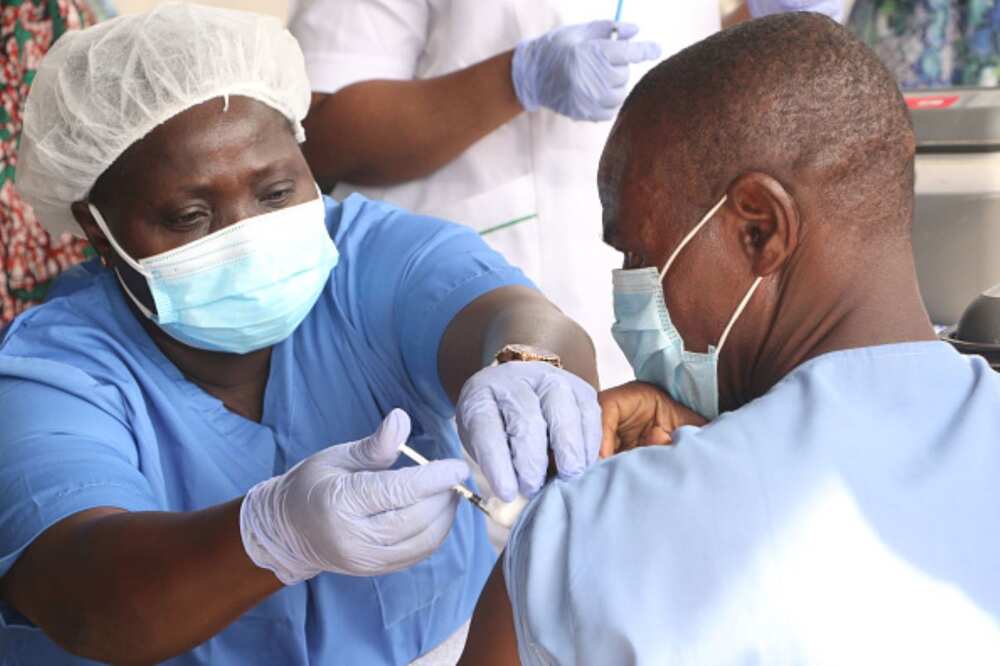New Report on COVID-19 in Africa Shows Widespread Willingness to Get Vaccinated
- A new report on COVID-19 in Africa shows widespread willingness to get vaccinated by people in the continent
- Experts say the new report underscores the need for consistent supply and additional logistical support to the continent
- Individual COVID-19 preventive measures, mark the path forward in protecting people while vaccine efforts scale-up
New York - As the Omicron variant dominates the COVID-19 news cycle, new research from the Partnership for Evidence-Based Response to COVID-19 (PERC) indicates that people in African Union Member states are overwhelmingly willing to get vaccinated.
Across 19 countries, 78% of people surveyed by PERC indicated that they had been or were willing to get vaccinated.

Source: Getty Images
However, as of November 2021, less than 7% of the African continent has been vaccinated.
Experts say this gap between acceptance and coverage demonstrates a substantial unmet need and underscores the importance of consistent and predictable vaccine supply as well as increased support for vaccination programs in Africa.
PAY ATTENTION: Join Legit.ng Telegram channel! Never miss important updates!
Legit.ng gathered that the latest PERC report considers why global vaccination efforts have been plagued by inequity, as well as the logistical challenges to vaccinating the African continent.
The report further outlines the continued importance of preventive measures that minimize the social or economic harm that can occur when mobility, economic and social gathering restrictions are imposed.
Dr. John Nkengasong, Director of the Africa Centres for Disease Control and Prevention said:
“We must work urgently toward equitable access to safe and effective vaccines on the African continent. The PERC data show that demand for vaccines is substantially higher than supply.”
Based on their findings, PERC authors recommend:
1. The global community should support AU Member States in supplying vaccines at a better coordinated and more systematic pace to allow broader, more effective, and equitable distribution. Resources and expertise to support vaccine delivery must be part of the supply machinery to ensure coverage.

Read also
Coca-Cola’s Project EQUIP Launches in Kano: Here Are 3 Areas the Initiative is Set to Tackle
2. COVID-19 preventive measures (described as public health and social measures, or PHSMs, in the report) are critical to mitigate COVID-19 transmission, particularly as new, possibly more transmissible, variants emerge in under-vaccinated populations. Promoting adherence must remain a top priority.
3. Ministries of Health have competing priorities - both maintaining longer-term investments in endemic diseases, such as HIV and tuberculosis, and preparing for and responding to immediate epidemics, such as yellow fever, Ebola, and measles. Investments in preparing health security systems can be utilized both for COVID-19-specific responses and long-term priorities.
4. Strengthening health data systems to be better prepared for health threats is critical. It is important that investments prioritize epidemiological data, as well as contextual data and data on community perceptions and actions toward countermeasures for disease mitigation and prevention. Together with the data itself, timely collection, analysis, and dissemination are integral to systems strengthening and emergency response.

Read also
Nigeria in the mix as WHO says increased healthcare costs pushes 500 million people into extreme poverty
5. The global community and national governments should invest - to the fullest extent possible in public health infrastructure and social protection programs that build and maintain resilience, in order to improve health and economic outcomes and reduce the opportunity costs of vaccination and PHSM adherence.
United Kingdom removes Nigeria from Red List countries
Recall that the United Kingdom recently yielded to the threats of the Nigerian government and yanked Nigeria off the Red List of countries not allowed in the UK due to the COVID-19 Omicron variant.
All the 11 countries on the travel ban were taken off on Wednesday morning, December 15 due to the diminishing concerns about Omicron cases being brought into the country.
Sajid Javid, UK’s Health Secretary said on Wednesday, December 8, that hotels will quarantine those arriving from some African countries.
British High Commissioner reveals why UK added Nigeria to travel red list
Legit.ng previously reported that the high commissioner to Nigeria, Catriona Laing explained why the UK made the decision to add the country to the travel red list.
According to her, the British government took the decision in order to protect the public health of its people while the government tries to understand the new variant.
She, however, said that the decision will be reviewed, which has already been done.
Source: Legit.ng


